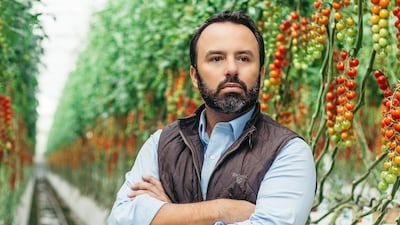Abu Dhabi agritech company Pure Harvest Smart Farms secured $60 million through two financing deals and may look to raise another $100m this year as it scales up operations and expands into other GCC markets.
The company obtained $50m through a Shuaa Capital-led structured Islamic debt deal in which Sancta Capital and Franklin Templeton were anchor investors.
It follows a $10m equity financing round led by Sancta Capital in January.
The funding “supports our aggressive growth campaign within the GCC region”, said Sky Kurtz, co-founder and chief executive of Pure Harvest.
“This type of financing underscores the innovation occurring within the region’s venture capital markets.”
Pure Harvest is expected to return to the debt market again in the next quarter and could raise as much as $100m more in growth funding this year, Mr Kurtz told The National.
“We are an early-stage company, but we are bit of a different animal ... we are building significant infrastructure,” he said.
“We haven’t yet decided how we are going to finance the next stages. If we finance only our Kuwaiti facility as a standalone project, then it might be a smaller number, to the tune of $40m to $50m.”
The company is in talks over its GCC expansion and a potential foray into Singapore next year, for which it will need more capital.
“What I can say comfortably is that we expect we will need at least $100m between now and next year to develop the plans that we currently have for new projects, just for the region alone,” said Mr Kurtz.
“If we secure additional projects in places such as South-East Asia for expansion next year, we will need additional capital.”
Pure Harvest, which aims to produce fruit and vegetables throughout the year, has raised $216m so far.
It will use the proceeds from the latest financing round to support the expansion of its capacity, attract new talent and boost research and development, including innovation projects in partnership with the Abu Dhabi Investment Office.
Covid-19 has highlighted the need for greater domestic food production to reduce a reliance on imports, said Mr Kurtz.
The pandemic, which had infected more than 120.5 million people around the world and killed more than 2.66 million as of yesterday, brought global trade to a halt last year.
The closure of borders to stem the spread of the virus also exposed how vulnerable food-importing countries were.
The GCC imports between 80 per cent and 90 per cent of its food requirements, according to Chatham House.
Better food security and agricultural innovation are among the top priorities for the UAE, the second-biggest Arab economy.
The Abu Dhabi government has already earmarked Dh1 billion ($272m) for an agritech incentives programme under its Ghadan 21 accelerator initiative.
Adio said in November that it would disperse $41m to three technology companies – Pure Harvest, grocery platform FreshToHome and space research company Nanoracks – to develop local expertise and come up with new ways to produce food in arid climates.
Efforts to improve local food production are already bearing fruit as farming ventures use technology to maximise output.
“Investors seeking access to middle-market credit transactions are increasing across the region, and it is particularly exciting in growth sectors that are addressing global challenges such as water scarcity and food security,” said Mohieddine Kronfol, global sukuk and fixed-income chief investment officer for the Mena region at Franklin Templeton.
“We are backing the region’s pioneer in high-tech agriculture and supporting their efforts to have a large-scale impact in the markets they serve.”
Pure Harvest said in September that it would invest more than €30m ($35.85m) to build a hi-tech farm in Kuwait that will supply fresh fruit and vegetables to The Sultan Centre, one of the country’s biggest independent supermarket operators.
The company also secured a multi-stage investment commitment of $100m last year from Kuwait’s Wafra International Investment Company to support recruitment and expansion across the region.
“We are passionate about our mission to make local-for-local production of high-quality fresh produce possible anywhere, including within the harsh climate of our home, the Arabian Gulf,” said Mr Kurtz.


